Nurses Narratives - Matron A Kellett - Part 1
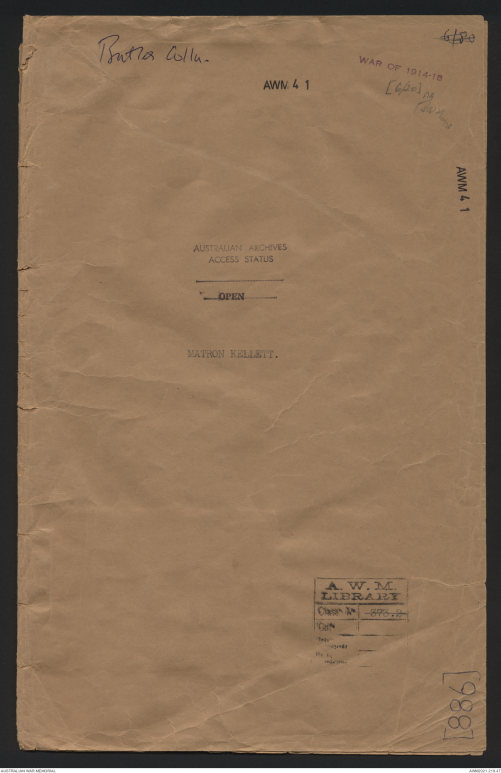
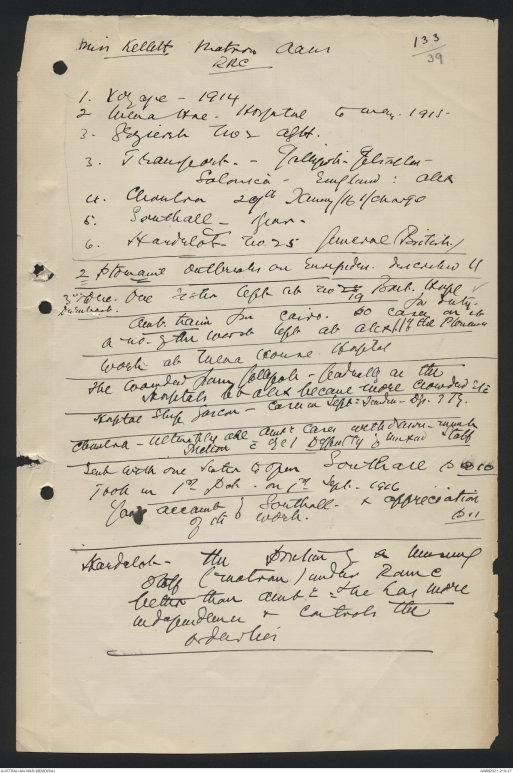
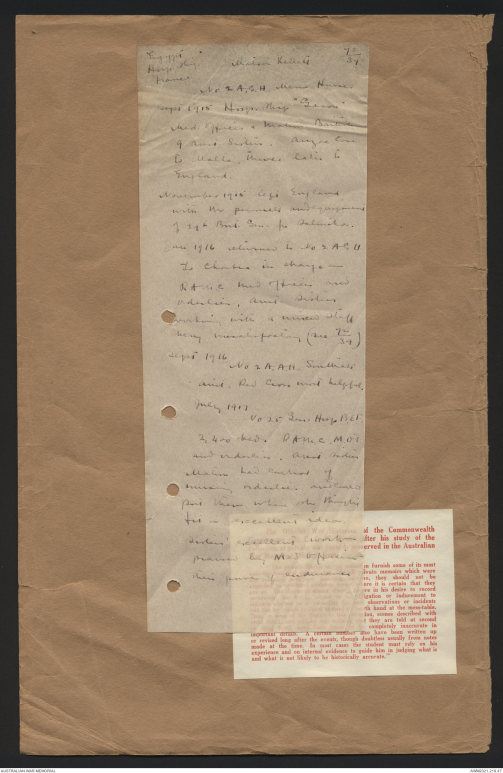
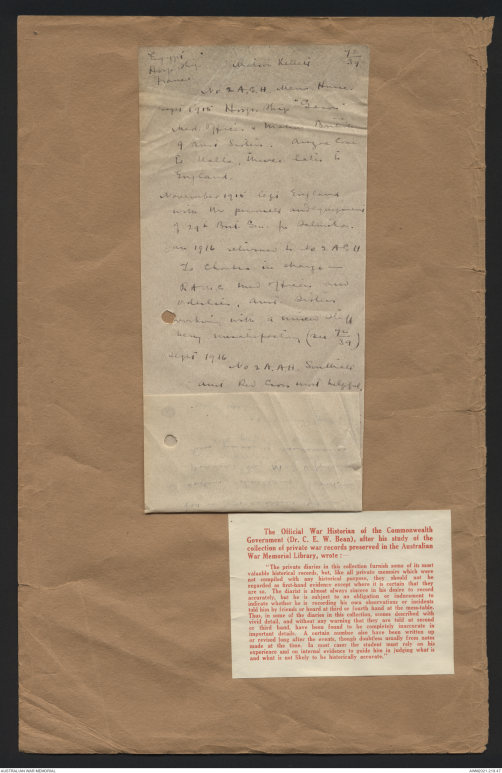
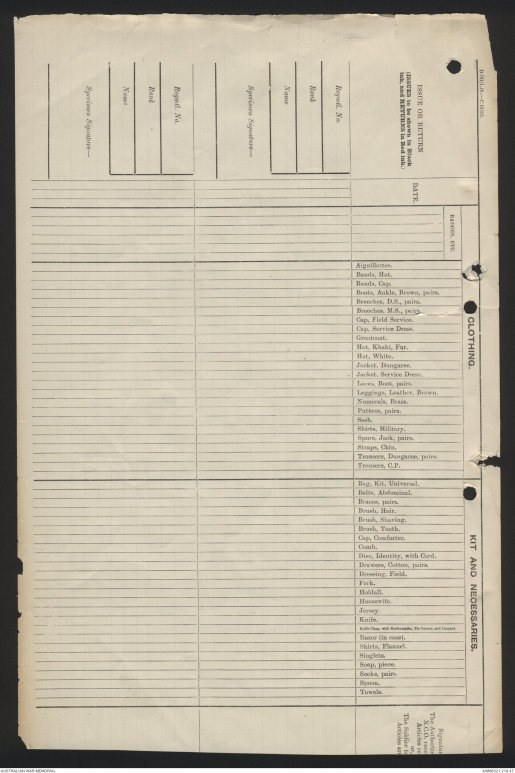
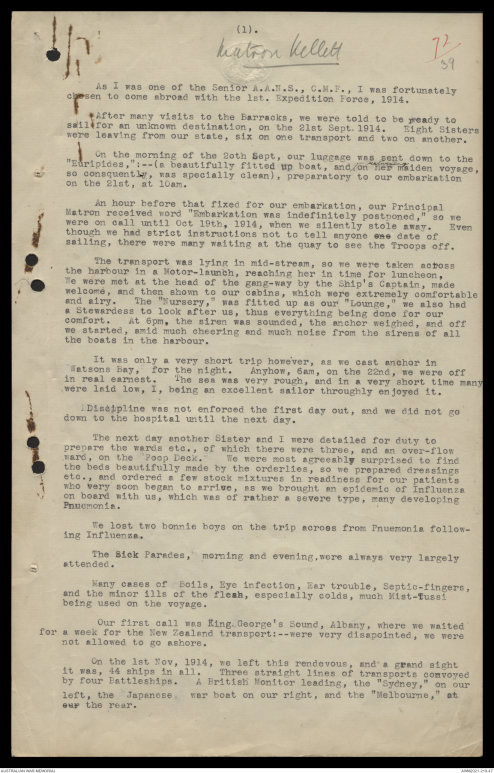
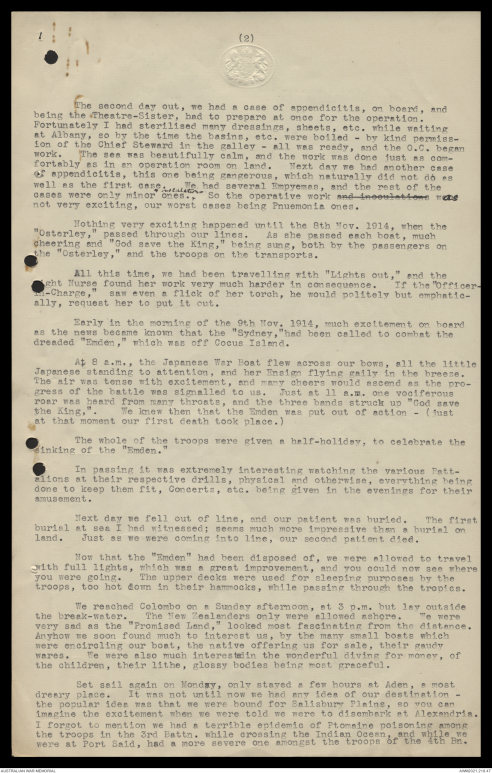
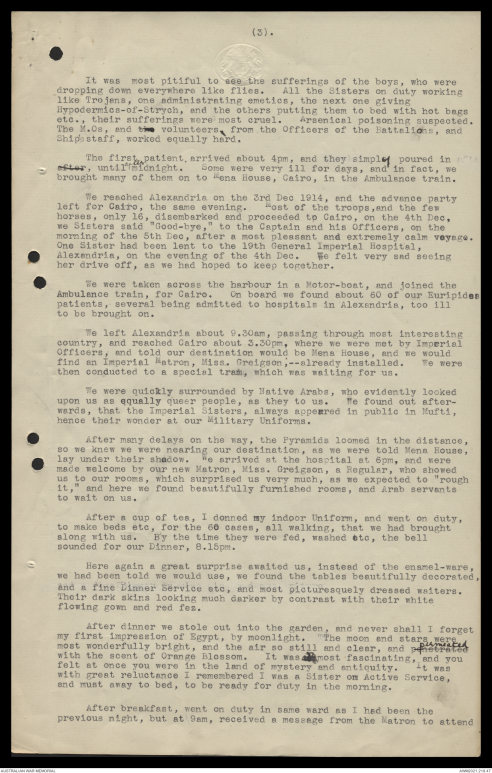
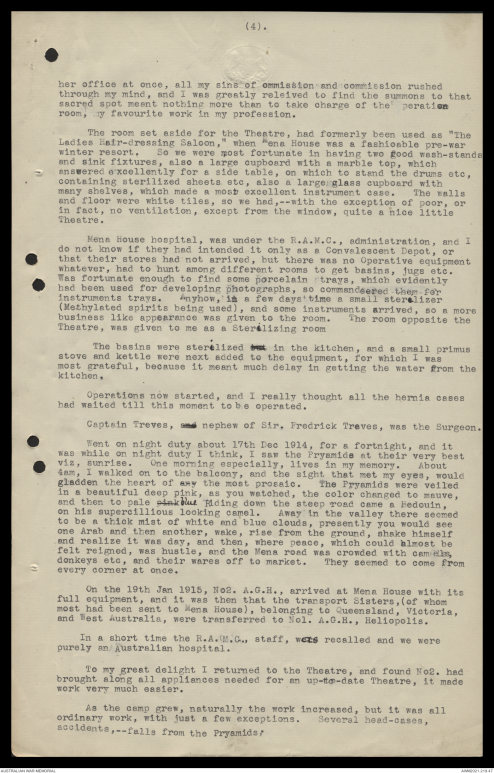
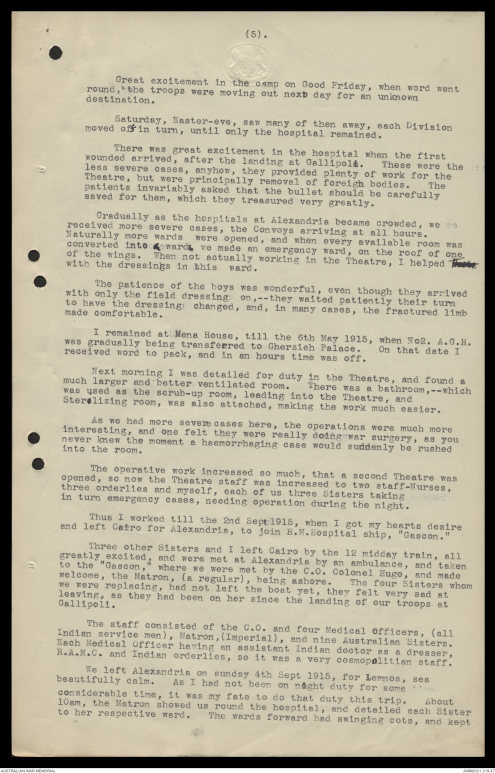
6/80
Butler Colln.
WAR OF 1914-18
AWM 4 1
[6/20]M
AUSTRALIAN ARCHIVES
ACCESS STATUS
OPEN
MATRON KELLETT.
See original stamp A. W. M. LIBRARY
[*988*]
Miss Kellett Matron AAM 133/39
RNC
1. Voyage - 1914
2. Mena Hse. Hospital to May 1915
3. Ghezirah No 2 AGH.
3. Transport - Gallipoli - Gibraltar -
Salonica - England : Alex
4. Choubra 29th Janry /16 I/charge
5. Southall - 1 year.
6. Hardelot No 25 General (British.)
—————————————————
2 Ptomaine outbreaks on Euripides. [[Inoculated 11?]]
————————————————————
[[3 Nurses disembark?]]. One Sister left at no 25 19 Brit. Hopl √
————————————————————for duty.
Amb. train for Cairo. 60 cases on it
a no. of the worst left at Alex//. of the Ptomaine
——————————————————————————
Work at Mena House Hospital
———————————————
The wounded from Gallipoli - Gradually at the
Hospitals as Alex became more crowded etc
———————————————————————
Hospital Ship Gascon - came in Sept: [[?Ofr. shorthand?]]
——————————————————————————————
Choubra - Ultimately all Aust Cases with Nurse - much
Matron with great difficulty with limited Staff
———————————————————————————
Sent with one Sister to open Southall to [[?]]
Took in 1st Pat. on 1st Sept. 1916
Gave account of Southall & appreciation
of the work. [[?]]
——————————————————————
Hardelot - the position of a Nursing
Staff (matron) under Ramc
better than amb & = she has more
independence & controls the
orderlies
————————————————————
Egypt 72/39
Hosp. ship.
France
Matron Kellett
No 2 A.G.H. Mena House.
Sept 1915 Hosp. ship "Gascon"
Med. Officers & Matron British
& Aust Sisters. Anzac Cove
to Malta. Thence later to
England.
November 1915 left England
with the personnel and equipment
of 29th Brit. Gen. for Salonica.
June 1916 returned to No 2 AGH.
to Choubra in charge -
RAMC Med officers and
orderlies, Aust. sisters
working with a mixed staff
many unsatisfactory (see 72/39)
Sept 1916
No 2 A.A.H. Southall
and Red Cross most helpful.
July 1917
No 25 Gen. Hosp. B.E.F.
2,400 bed. RAM.C. MO's
and orderlies. Aust sisters
Matron had control of
nursing orderlies and could
put them where she thought
fit - excellent idea.
Sisters' excellent work -
praised by Med Officers -
their powers of endurance
[[This page shows the contents of the previous page however it has been folded at the bottom
to reveal Dr. C. E. W. Bean's disclosure. - Please remove this notation as necessary.]]
The Official War Historian of the Commonwealth
Government (Dr. C. E. W. Bean), after his study of the
collection of private war records preserved in the Australian
War Memorial Library, wrote:-
"The private diaries in this collection furnish some of its most
valuable historical records, but, like all private memoirs which were
not compiled with any historical purpose, they should not be
regarded as first-hand evidence except where it is certain that they
are so. The diarist is almost always sincere in his desire to record
accurately, but he is subject to no obligation or inducement to
indicate whether he is recording his own observations or incidents
told him by friends or heard at third or fourth hand at the mess table.
Thus, in some of the diaries in this collection events described with
vivid details, and without any warning that they are told at second
or third hand, have been found to be completely inaccurate in
important details. A certain number also have been written up
or revised long after the events, though doubtless usually from notes
made at the time. In most cases the student must rely on his
experience and on informal evidence to guide him in judging what is
and what is not likely to be historically accurate."
ISSUE OR RETURN
(ISSUES to be shown in Black
ink and RETURNS in Red ink.)
Regmtl. No.
Rank
Name
Specimen Signature
Regmtl. No.
Rank
Name
Specimen Signature
DATE
(xxxxx. ETC.?)
CLOTHING.
Aiguillettes.
Beads, Hat.
Beads, Cap.
Boots, Ankle, Brown, pairs.
Breeches, D.S., pairs.
Breeches, M.S., pairs.
Cap, Field Service.
Cap, Service Dress.
Greatcoat.
Hat, Khaki, Fur.
Hat, White.
Jacket, Dungaree.
Jacket, Service Dress.
Laces, Boot, Pairs.
Leggings, Leather, Brown.
Numerals, Brass.
Puttees, pairs.
Sash.
Shirts, Military.
Spurs, Jack, pairs.
Straps, Chin.
Trousers, Dungarees, pairs.
Trousers, C.P.
KIT AND NECESSARIES.
Bag, Kit Universal.
Belts, Abdominal.
Braces, pairs.
Brush, Hair.
Brush, Shaving.
Brush, Tooth.
Cap, Comforter.
Comb.
Disc, Identity, with Card.
Drawers, Cotton, pairs.
Dressing, Field.
Fork.
Holdall.
Housewife.
Jersey.
Knife.
Razor (in case).
Shirts, Flannel.
Singlets.
Soap, piece
Socks, pairs.
Spoon.
Towels.
Signature
The Authori
M.C.O.
Articles
or
The Soldier
Articles
(1).
Matron Kellett 72/39
As I was one of the Senior A.A.N.S., C.M.F., I was fortunately
chosen to come abroad with the 1st. Expedition force, 1914.
After many visits to the Barracks, we were told to be ready to
sail for an unknown destination, on the 21st Sept. 1914. Eight Sisters
were leaving from our state, six on one transport and two on another.
On the morning of the 2oth Sept, our luggage was sent down to the
"Euripides," :- - (a beautifully fitted up boat, and ^returning on her maiden voyage,
so consequently, was specially clean), preparatory to our embarkation
on the 21st, at 10am.
An hour before that fixed for our embarkation, our Principal
Matron received word "Embarkation was indefinitely postponed," so we
were on call until Oct 19th, 1914, when we silently stole away. Even
though we had strict instructions not to tell anyone one date of
sailing, there were many waiting at the quay to see the Troops off.
The transport was lying in mid-stream, so we were taken across
the harbour in a Motor-launch, reaching her in time for luncheon.
We were met at the head of the gang-way by the Ship's Captain, made
welcome, and then shown to our cabins, which were extremely comfortable
and airy. The "Nursery," was fitted up as our "Lounge," we also had
a Stewardess to look after us, thus everything being done for our
comfort. At 6pm, the siren was sounded, the anchor weighed, and off
we started, amid much cheering and much noise from the sirens of all
the boats in the harbour.
It was only a very short trip however, as we cast anchor in
Watsons Bay, for the night. Anyhow, 6am, on the 22nd, we were off
in real earnest. The sea was very rough, and in a very short time many
were laid low, I, being an excellent sailor thoroughly enjoyed it.
Discipline was not enforced the first day out, and we did not go
down to the hospital until the next day.
The next day another Sister and I were detailed for duty to
prepare the wards etc., of which there were three, and an over-flow
ward, on the "Poop Deck." We were most agreeably surprised to find
the beds beautifully made by the orderlies, so we prepared dressings
etc., and ordered a few stock mixtures in readiness for our patients
who very soon began to arrive, as we brought an epidemic of Influenza
on board with us, which was of rather a severe type, many developing
Pneumonia.
We lost two bonnie boys on the trip across from Pneumonia following
Influenza.
The Sick Parades, morning and evening, were always very largely
attended.
Many cases on Boils, Eye infection, Ear trouble, Septic-fingers,
and the minor ills of the flesh, especially colds, much Mist-Tussi
being used on the voyage.
Our first call was King George's Sound, Albany, where we waited
for a week for the New Zealand transport: - - were very disapointed, we were
not allowed to go ashore.
On the 1st Nov. 1914, we left this rendevous, and a grand sight
it was 44, ships in all. Three straight lines of transports convoyed
by four Battleships. A British Monitor leading, the "Sydney," on our
left, the Japanese war boat on our right, and the "Melbourne," atour the rear.
(2)
The second day out, we had a case of appendicitis, on board, and
being the Theatre-Sister, had to prepare at once for the operation.
Fortunately I had sterilised many dressings, sheets, etc. while waiting
at Albany, so by the time the basins, etc. were boiled - by kind permission
of the Chief Steward in the galley - all was ready, and the O.C. began
work. The sea was beautifully calm, and the work was done just as comfortably
as in an operation room on land. Next day we had another case
of appendicitis, this one being gangerous, which naturally did not do as
well as the first case. We had several Empyemas, and the rest of the
cases were only minor ones. ^& inoculations So the operative work and inoculations was
not very exciting, our worst cases being Pneumonia ones.
Nothing very exciting happened until the 8th Nov. 1914, when the
"Osterley," passed through our lines. As she passed each boat, much
cheering and "God save the King," being sung, both by the passengers on
the "Osterley," and the troops on the transports.
All this time, we had been travelling with "Lights out," and the
Night Nurse found her work very much harder in consequence. If the "Officer-
in-Charge," saw even a flick of her torch, he would politely but emphatically,
request her to put it out.
Early in the morning of the 9th Nov. 1914, much excitement on board
as the news became known that the "Sydney," had been called to combat the
dreaded "Emden," which was off Cocus Island.
At 8 a.m., the Japanese War Boat flew across our bows, all the little
Japanese standing to attention, and her Ensign flying gaily in the breeze.
The air was tense with excitement, and many cheers would ascend as the progress
of the battle was signalled to us. Just at 11 a.m. one vociferous
roar was heard from many throats, and the three bands struck up "God save
the King,". We knew then that the Emden was put out of action - (just
at that moment our first death took place.)
The whole of the troops were given a half-holiday, to celebrate the
sinking of the "Emden."
In passing it was extremely interesting watching the various Battalions
at their respective drills, physical and otherwise, everything being
done to keep them fit, Concerts, etc. being given in the evenings for their
amusement.
Next day we fell out of line, and our patient was buried. The first
burial at sea I had witnessed; seems much more impressive than a burial on
land. Just as we were coming into line, our second patient died.
Now that the "Emden" had been disposed of, we were allowed to travel
with full lights, which was a great improvement, and you could now see where
you were going. The upper decks were used for sleeping purposes by the
troops, too hot down in their hammocks, while passing through the tropics.
We reached Colombo on a Sunday afternoon at 3 p.m. but lay outside
the break-water. The New Zealanders only were allowed ashore. We were
very sad as the "Promised Land," looked most fascinating from the distance.
Anyhow we soon found much to interest us, by the many small boats which
were encircling our boat, the native offering us for sale, their gaudy
wares. We were also much interestedin the wonderful diving for money, of
the children, their lithe, glossy bodies being most graceful.
Set sail again on Monday, only stayed a few hours at Aden, a most
dreary place. It was not until now we had any idea of our destination -
the popular idea was that we were bound for Salisbury Plains, so you can
imagine the excitement when we were told we were to disembark at Alexandria.
I forgot to mention we had a terrible epidemic of Ptomaine poisoning among
the troops in the 3rd Battn. while crossing the Indian Ocean, and while we
were at Port Said, had a more severe one amongst the troops of the 4th Bn.
(3).
It was most pitiful to see the sufferings of the boys, who were
dropping down everywhere like flies. All the Sisters on duty working
like Trojans, one administrating emetics, the next one giving
Hypodermics-of-Strych, and the others putting them to bed with hot bags
etc., their sufferings were most cruel. Arsenical poisoning suspected.
The M.Os. and the volunteers, from the Officers of the Battalions, and
Ship's staff, worked equally hard.
The first patient arrived about 4 pm, and they simply poured in
after, until ^after midnight. Some were very ill for days, and in fact, we
brought many of them on to Mena House, Cairo, in the Ambulance train.
We reached Alexandria on the 3rd Dec 1914, and the advance party
left for Cairo, the same evening. Most of the troops, and the few
horses, only 16, disembarked and proceeded to Cairo, on the 4th Dec.
we Sisters said "Good-bye," to the Captain and his Officers, on the
morning of the 5th Dec, after a most pleasant and extremely calm voyage.
One Sister has been lent to the 19th General Imperial Hospital,
Alexandria, on the evening of the 4th Dec. We felt very sad seeing
her drive off, as we had hoped to keep together.
We were taken across the harbour in a Motor-boat, and joined the
Ambulance train, for Cairo. On board we found about 60 of our Euripides
patients, several being admitted to hospitals in Alexandria, too ill
to be brought on.
We left Alexandria about 9.30am, passing through most interesting
country, and reached Cairo about 3.30pm, where we were met by Imperial
Officers, and told our destination would be Mena House, and we would
find an Imperial Matron, Miss. Greigson,--already installed. We were
then conducted to a special tram, which was waiting for us.
We were quickly surrounded by Native Arabs, who evidently looked
upon us as equally queer people, as they to us. We found out afterwards,
that the Imperial Sisters, always appeared in public in Mufti,
hence their wonder at our Military Uniforms.
After many delays on the way, the Pyramids loomed in the distance,
so we knew we were nearing our destination, as we were told Mena House,
lay under their shadow. We arrived at the hospital at 6pm, and were
made welcome by our new Matron, Miss. Greigson, a Regular, who showed
us to our rooms, which surprised us very much, as we expected to "rough
it," and here we found beautifully furnished rooms, and Arab servants
to wait on us.
After a cup of tea, I donned my indoor Uniform, and went on duty,
to make beds etc, for the 60 cases, all walking, that we had brought
along with us. By the time they were fed, washed etc, the bell
sounded for our Dinner, 8.15pm.
Here again a great surprise awaited us, instead of the enamel-ware,
we had been told we would use, we found the tables beautifully decorated,
and a fine Dinner Service etc. and most picturesquely dressed waiters.
Their dark skins looking much darker by contrast with their white
flowing gown and red fez.
After dinner we stole out into the garden, and never shall I forget
my first impression of Egypt, by moonlight. The moon and stars were
most wonderfully bright, and the air so still and clear, and penetrated permeated
with the scent of Orange Blossom. It was xxx most fascinating, and you
felt at once you were in the land of mystery and antiquity. It was
with great reluctance I remembered I was a Sister on Active Service,
and must away to bed, to be ready for duty in the morning.
After breakfast, went on duty to same ward as I had been the
previous night, but at 9am, received a message from the Matron to attend
(4).
her office at once, all my sins of ommission and commission rushed
through my mind, and I was greatly releived to find the summons to that
sacred spot meant nothing more than to take charge of the Operation
room, my favourite work in my profession.
The room set aside for the Theatre, had formerly been used as "The
Ladies Hair-dressing Saloon," when Mena House was a fashioable pre-war
winter resort. So we were most fortunate in having two good wash-stands
and sink fixtures, also a large cupboard with a marble top, which
answered excellently for a side table, on which to stand the drums etc,
containing sterilized sheets etc, also a large glass cupboard with
many shelves, which made a most excellent instrument case. The walls
and floor were white tiles, so we had, --with the exception of poor, or
in fact, no ventilation, except from the window, quite a nice little
Theatre.
Mena House hospital, was under R.A.M.C., administration, and I
do not know if they had intended it only as a Convalescent Depot, or
that their stores had not arrived, but there was no Operative equipment
whatever, had to hunt among different rooms to get basins, jugs etc.
Was fortunate enough to find some porcelain trays, which evidently
had been used for developing photographs, so commandeered them for
instruments trays. Anyhow, in a few days' time a small sterilizer
(Methylated spirits being used), and some instruments arrived, so a more
business like appearance was given to the room. The room opposite the
Theatre, was given to me as a Sterilizing room
The basins were sterilized xxx in the kitchen, and a small primus
stove and kettle were next added to the equipment, for which I was
most grateful, because it meant much delay in getting the water from the
kitchen.
Operations now started, and I really thought all the hernia cases
had waited till this moment to be operated.
Captain Treves, xxx nephew of Sir. Fredrick Treves, was the Surgeon.
Went on night duty about 17th Dec 1914, for a fortnight, and it
was while on night duty I think, I saw the Pryamids at their very best
viz, sunrise. One morning especially, lives in my memory. About
4am, I walked on to the balcony, and the sight that met my eyes, would
gladden the heart of any the most prosaic. The Pryamids were veiled
in a beautiful deep pink, as you watched, the color changed to mauve,
and then to pale pink blue Riding down the steep road came a Bedouin,
on his supercillious looking camel. Away in the valley there seemed
to be a thick mist of white and blue clouds, presently you would see
one Arab and then another, wake, rise from the ground, shake himself
and realize it was day, and then, where peace, which could almost be
felt reigned, was hustle, and the Mena road was crowded with camels,
donkeys etc, and their wares off to market. They seemed to come from
every corner at once.
On the 19th Jan 1915, No2. A.G.H., arrived at Mena House with its
full equipment, and it was then that the transport Sisters, (of whom
most had been sent to Mena House), belonging to Queensland, Victoria,
and West Australia, were transferred to No1. A.G.H., Heliopolis.
In a short time the R.A.M.C., staff, was recalled and we were
purely an Australian hospital.
To my great delight I returned to the Theatre, and found No2. had
brought along all appliances needed for an up-to-date Theatre, it made
work very much easier.
As the camp grew, naturally the work increased, but it was all
ordinary work, with just a few exceptions. Several head-cases,
accidents, --falls from the Pryamids.
(5).
Great excitement in the camp on Good Friday, when word went
round, the troops were moving out next day for an unknown
destination.
Saturday, Easter-eve, saw many of them away, each Division
moved off in turn, until only the hospital remained.
There was great excitement in the hospital when the first
wounded arrived, after the landing at Gallipoli. These were the
less severe cases, anyhow, they provided plenty of work for the
Theatre, but were principally removal of foreign bodies. The
patients invariably asked that the bullet should be carefully
saved for them, which they treasured very greatly.
Gradually as the hospitals at Alexandria became crowded, we
received more severe cases, the Convoys arriving at all hours.
Naturally more wards were opened, and when every available room was
converted into a wards, we made an emergency ward, on the roof of one
of the wings. When not actually working in the Theatre, I helped there
with the dressings in this ward.
The patience of the boys was wonderful, even though they arrived
with only the field dressing on, -- they waited patiently their turn
to have the dressing changed, and, in many cases, the fractured limb
made comfortable.
I remained at Mena House, till the 6th May 1915, when No2. A.G.H.
was gradually being transferred to Gherzieh Palace. On that date I
received word to pack, and in an hours time was off.
Next morning I was detailed for duty in the Theatre, and found a
much larger and better ventilated room. There was a bathroom,--which
was used as the scrub-up room, leading into the Theatre, and
Sterilizing room was also attached, making the work much easier.
As we had more severe cases here, the operations were much more
interesting, and one felt they were really doing war surgery, as you
never knew the moment a haemorrhaging case would suddenly be rushed
into the room.
The operative work increased so much, that a second Theatre was
opened, so now the Theatre staff was increased to two staff-Nurses,
three orderlies and myself, each of us three Sisters taking
in turn emergency cases, needing operation during the night.
Thus I worked till the 2nd Sept 1915, when I got my hearts desire
and left Cairo for Alexandria, to join H.M. Hospital ship, "Gascon."
Three other Sisters and I left Cairo by the 12 midday train, all
greatly excited, and were met at Alexandria by an ambulance, and taken
to the "Gascon," where we were met by the C.O. Colonel Hugo, and made
welcome, the Matron, (a regular), being ashore. The four Sisters whom
we were replacing, had not left the boat yet, they felt very sad at
leaving, as they had been on her since the landing of our troops at
Gallipoli.
The staff consisted of the C.O. and four Medical Officers, (all
Indian service men), Matron, (Imperial), and nine Australian Sisters.
Each Medical Officer having an assistant Indian doctor as a dresser,
R.A.M.C. and Indian orderlies, so it was a very cosmopolitian staff.
We left Alexandria on sunday 4th Sept 1915, for Lemnos, sea
beautifully calm. As I had not been on night duty for some
considerable time, it was my fate to so that duty this trip. About
10am, the Matron showed us round the hospital, and detailed each Sister
to her respective ward. The wards forward had swinging cots, and kept
 Sam scott
Sam scottThis transcription item is now locked to you for editing. To release the lock either Save your changes or Cancel.
This lock will be automatically released after 60 minutes of inactivity.